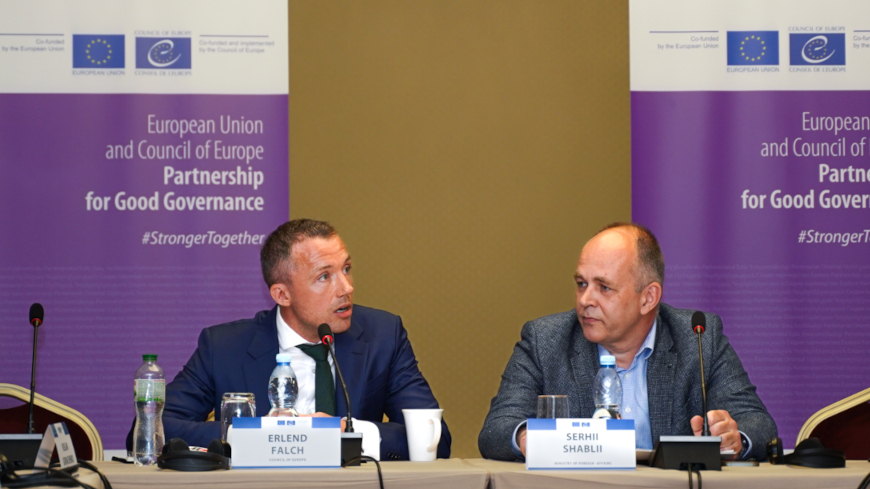New projects aimed at countering economic crime and hate speech, promoting equality and non-discrimination, advancing women’s access to justice and combating violence against women, were presented on Tuesday 27 June, 2023, in Kyiv as part of the third phase of the joint EU/Council of Europe Partnership for Good Governance (2023-2027) programme.
The Council of Europe and the Delegation of the European Union to Ukraine, together with 50 representatives of national partner institutions, discussed joint actions at the first Local Steering Committee meeting for the new phase of the Partnership for Good Governance (PGG) for Ukraine.
“The EU stands with Ukraine and will support the country as long as it takes,” stated Xavier Camus, Head of Section Good Governance, European Union Delegation to Ukraine. Delphine Freymann, Head of the Programming and Resource Mobilisation Department, Directorate of Programme Co-ordination, Council of Europe followed by adding “the Council of Europe through the Partnership for Good Governance (PGG) in particular, has adjusted its support to address Ukraine’s urgent needs in times of war and help the country to continue operating in line with European standards on human rights, the rule of law and democracy. We express our admiration for the resilience and commitment of the government, local authorities, civil society organisations, having continued to carry out implementation, despite the scale of challenges in the current situation.”
Serhii Shablii, Head of Division of the Council of Europe, Human Rights and Gender issues, Department General for International Organizations, Ministry of Foreign Affairs of Ukraine, PGG National Co-ordinator, continued by stating: “In this difficult and often tragic period for Ukraine, the support of the international community is extremely important for our state. It is clear, that the military component in overcoming Russian aggression is currently an undoubted priority. Our state is currently forced to direct significant resource efforts to contain the aggressor country and repel its new encroachments. However, the segments corresponding to the mandate of the Council of Europe, namely: the protection of human rights, democracy, and the rule of law, - projects implemented within the framework of the PGG are also very significant.”
“The PGG has an important new role in the new context in supporting Ukraine in its EU accession Reform Agenda in line with Council of Europe standards. The added value of working together with the EU and the Council of Europe in Ukraine’s key areas is even stronger,” concluded Delphine Freymann.
Two country-specific projects will be implemented in Ukraine, with a total budget of 1 million euros, co-funded by the EU and the Council of Europe. The projects will build on the results of the previous phases and will continue aiming at combating hate speech, strengthening measures to prevent and combat economic crime, enhancing anti-money laundering, counter terrorist financing and asset recovery regime.
At regional level, three projects will be implemented in Eastern Partnership countries, including Ukraine. The regional projects will aim at fighting economic crime, promoting equality and non-discrimination, and facilitating access of women to justice. Their goals are to encourage networking, provide a platform for sharing lessons learned and best practices, and, where relevant, complement country-specific projects.
Access the Ukraine country page for more information on the PGG projects implemented





